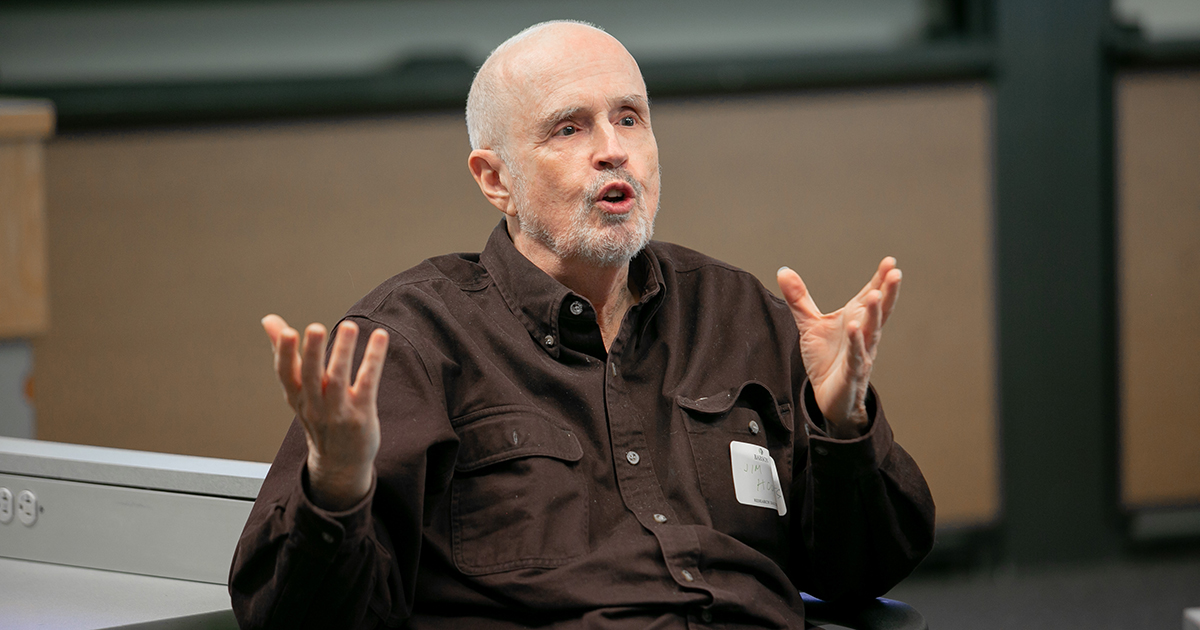Can Capitalism Be Ethical?

For a professor focused on the past, James Hoopes always has been ahead of the times.
Over the past three decades at Babson College, Hoopes has taught a course on the history of capitalism. But, about seven or eight years ago, seeing an opportunity to enrich his syllabus, he made a significant shift and changed the course to The History and Ethics of Capitalism.
“It has evolved. It used to have no ethical content. It was just simply the history of what happened and why,” said Hoopes, the Murata Professor of Ethics in Business at Babson. “So, this course on the history and ethics of capitalism is both about the moral risks and the moral opportunities of capitalism.”
Rooted in the lessons of the past, it is a weighty and important subject that speaks to the present—and the future. And, it is part of a growing trend as businesses and individuals increasingly incorporate and prioritize social responsibility; sustainability; ESG (environmental, social, and governance) investing; and diversity, equity, and inclusion.
For its importance and timeliness, Hoopes’ course recently was honored with a 2021 Ideas Worth Teaching Award by the Aspen Institute.
Foundations for the Future
Hoopes’ course was one of only eight business school courses recognized by the Aspen Institute for advancing “important new ideas about the role of business in creating a sustainable, inclusive society.”
“We believe we are experiencing a once-in-a-generation opportunity to reposition the fundamental relationship between business and society,” said Jaime Bettcher, program manager at the Aspen Institute Business & Society Program, which oversees the awards selection process. “We believe that the courses recognized among this year’s winners point the way for a world that will be on stronger and more just foundations in the future.”
Hoopes recently attended a virtual session with the other winning faculty, who teach courses such as Advancing Racial Equity at Work; Relationships and Reconciliation in Business and Beyond; and Sustainable and Responsible Investing. The eight winners were chosen from a pool of nominations representing 90 schools from 19 countries.
“It’s a little humbling,” Hoopes said. “It’s nice to have somebody outside the College recognize that what you’re doing is good. While it’s very nice, there are lots of other people doing really good work at Babson.”
“Sometimes, people find creative new strategies that turn out to be much more profitable than their less virtuous competitors.”
Professor James Hoopes
The Virtue of Virtue Ethics
The History and Ethics of Capitalism provides Babson students with a new perspective.
“The biggest agenda in the course is to reset the ethical framework with which they think about capitalism,” Hoopes said.
Hoopes draws on the lessons of Aristotle and Adam Smith in their books, Nicomachean Ethics and The Wealth of Nations. “Aristotle taught that moral virtue is a habit that takes practice to develop, and Adam Smith agreed,” said Hoopes, who describes virtue ethics as focusing on the character of the individual. The professor also raises questions of how virtue can make money, and if it’s right for money to be a motive for virtue.

James Hoopes, the Murata Professor of Ethics in Business at Babson College
“The course is about both the dangers that capitalism poses to your character and the opportunities it provides to become a better person, not just to make more money, but to develop virtues such as kindness, generosity, integrity, and so forth,” Hoopes said. “There are no guarantees in moral life, same as in financial life, but hard work and knowing what you’re doing can reduce your risk and increase your opportunities.”
Hoopes draws inspiration and examples from another course he teaches, Social Responsibility in Malaysia and Thailand, in which, prior to the pandemic, he would take 20 undergraduate students to Southeast Asia to visit exceptional companies. From those visits and his contacts, he has created valuable case studies that he uses in The History and Ethics of Capitalism.
The case studies, he says, show that virtue can be a competitive disadvantage, putting a company in a position that it can’t do some things its less virtuous competitors might do. “But, sometimes virtue can have a very positive effect as well,” Hoopes said. “You work extra hard at finding offsetting advantages and competencies in order to do the virtuous thing. Sometimes, people find creative new strategies that turn out to be much more profitable than their less virtuous competitors would have found because they wouldn’t have looked as hard. That’s the fundamental idea.”
An idea worth teaching, for sure, as evidenced by the Aspen Institute’s award.




